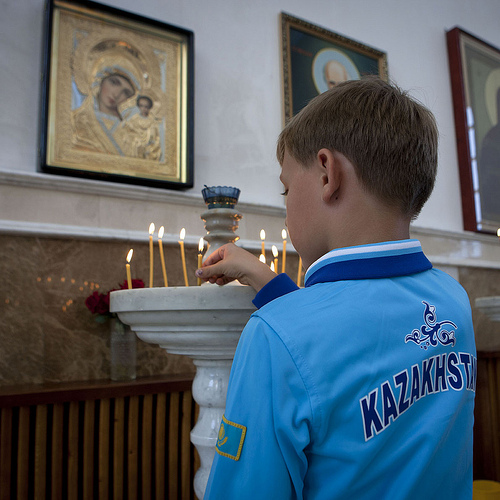
Kazakhstan Adopts a Controversial Religious Law
Publication: Eurasia Daily Monitor Volume: 8 Issue: 188
By:

On September 29, Kazakhstan’s upper house of parliament passed a new controversial law on religious activities and religious organizations intended to curb the spread of radical Islam in the country. The bill was approved speedily after a wave of terrorist attacks swept western Kazakhstan during the summer. It will become effective immediately after President Nursultan Nazarbayev signs it into law.
The Kazakh authorities declared in August that the threat of radical Islam and terrorism in the country is real and growing. “There is a growing risk of interethnic and inter-religious conflict. The threat of a new onslaught of international terrorism remains high,” President Nazarbayev told parliament on September 1. Local analysts commented that this is the first time alarm about terrorism has been sounded at such a high level, indicating serious official concern (Central Asia Online, September 8). Nazarbayev urged parliament to consider a new law on religious activities “to bring order to our house.” The bill that requires re-registration of all religious organizations based on their teachings, which deals with illegal mosques and places a ban on naming them after their founders, has caused concern among human rights organizations that it could negatively affect all non-traditional denominations.
The new law defines the state as secular, bans the adoption of any faith as the state religion, and declares all religious communities equal before the law. However, the strict registration requirements are likely to permit only two religious communities to operate nationwide – the Hanafi school of Islam and the Orthodox Christian Church – whose historical role “in the development of the culture and spiritual life of the nation” is recognized in the preamble. The law requires all religious groups to re-register with the authorities and introduces numerical minimums regarding the size of religious communities eligible for registration. Local religious organizations need 50 members, regional ones 500 members, and nationwide registration can be granted only if the organization has 5,000 members in all regions of Kazakhstan. Currently, there are 4,500 registered religious communities (RIA Novosti Kazakhstan, September 27).
The law also requires anyone engaged in “missionary activity” to re-register. Foreign missionaries can be expelled if deemed to pose a threat to the “constitutional order and public peace.” The law prohibits unregistered religious activities and introduces high penalties for violation of the ban. In addition, prayer rooms in state institutions will be banned, a provision objected to by some Kazakh religious leaders.
Human rights groups have criticized several of the provisions of the law including the requirement for religious organizations to submit to a “religious study examination” by a government body and the restrictions on the distribution of religious literature outside of religious buildings and religious educational institutions. The Director of the OSCE Office for Democratic Institutions and Human Rights (ODIHR), Ambassador Janez Lenarčič said that in its current form the new legislation would constitute a step back in Kazakhstan’s compliance with OSCE commitments (https://www.osce.org/odihr/83191, September 29).
This is not the first attempt by the Kazakh government to institute tougher regulations on religious activities in the country. Kazakhstan’s Constitutional Council rejected the previous two attempts in 2002 and 2009 amidst international criticism. This time, however, the law is unlikely to be rejected. The uncharacteristic outburst of Islamist-inspired violence in the oil-rich western regions of the country over the summer and numerous incidents of religious confrontation between Hanafi and Salafi Muslims stiffened the authorities’ resolve to prevent the expansion of radical Islamic movements.
On May 17, a suicide bomber targeted the National Security Committee (KNB) in Aktobe. This was the first suicide bombing in the country. The incident was followed by a car explosion in front of the KNB headquarters in the capital Astana killing two people. In June, two police officers were shot dead in Shubarshi, a village 250 kilometers from Aktobe. The unfolding security operation left nine suspects and two more policemen dead. The incidents continued in Aktobe with a police officer shot dead from inside a house by a man who then blew himself up.
On August 29, Kazakh law enforcement officials announced they had thwarted a plot to carry out terrorist attacks in the oil rich Atyrau region in western Kazakhstan. The press-service of the Atyrau Procurator’s Office said that law enforcement authorities have eradicated an extremist group in the region (Tengri News, September 30). The security services reportedly dealt with the terrorist cell in a targeted manner, limiting the impact on the wider population.
Kazakh analyst Dosim Satpaev believes that the security services have lobbied for a tougher law on religious activities to give them additional instruments for control over pseudo-religious organizations after the terrorist attacks in Aktobe and Atirau (RIA Novosti-Kazakhstan, September 28). The authorities, however, rely too much on this law in their struggle with radicalism, he said.
Most Muslims in Kazakhstan adhere to the moderate Hanafi school of Islam, but the more stringent Salafism from the Middle East is reportedly penetrating the younger generation of Kazakhs, causing conflict within families and religious communities. Lack of understanding of Islam is a serious concern for the government. The Religious Affairs Agency claims that only seven percent of the Muslim clergy in 2,500 mosques is capable of correctly interpreting Islam (Deutsche Welle, September 30).
Religious leaders and political experts have also argued that the new law will have little effect on extremist organizations that have always operated clandestinely. Religious communities that do not belong to the mainstream Hanafi Islam will probably fail to pass registration requirements and are likely to go underground (Deutsche Welle, September 30). The Supreme Mufti of Kazakhstan Absattar Derbisali also criticized the new law, particularly the ban on prayer rooms in state institutions, warning that the restrictions it imposed on pious Muslims could spur extremism (www.islamonline.net, October 1).




